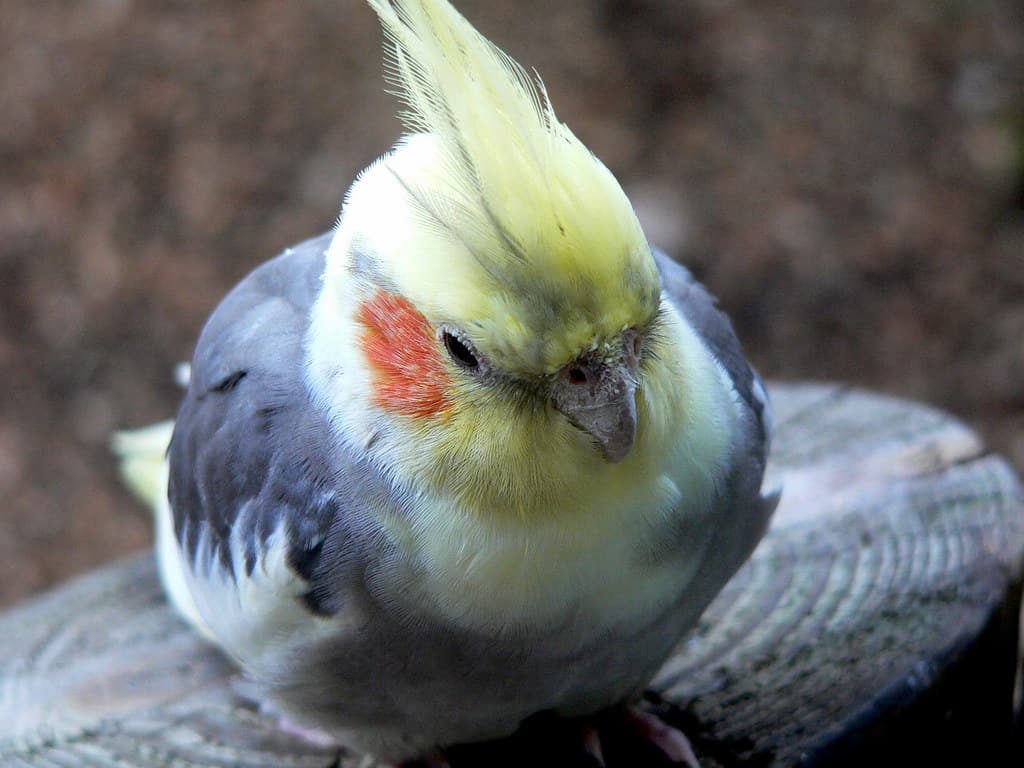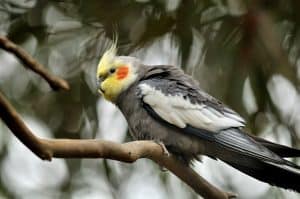When it comes to cockatiel intelligence, many people are pleasantly surprised by the cognitive abilities of these popular pet birds. As members of the parrot species, cockatiels possess a level of bird intelligence that can rival other larger and more exotic parrot varieties. What makes these small, Australian natives stand out among other birds is their capacity to learn and adapt, especially when interacting with their human caretakers.
Cockatiel owners often marvel at their birds’ knack for problem-solving, social skills, and even emotional intelligence. These smart cockatiels demonstrate an impressive range of cognitive abilities when compared to other bird species. In fact, some avian intelligence studies have found that cockatiels and other parrots possess more neurons in their brains than some larger animals, such as primates and mammals.
For example, a content cockatiel might suddenly start whistling a tune they’ve heard just once or learn to mimic several different sounds in a short period of time. Pet owners who provide their cockatiels with puzzle toys and opportunities for mental stimulation often notice their birds’ growing ability to solve problems creatively. As more anecdotal evidence and scientific research emerge, it’s clear that cockatiel intelligence should not be underestimated.
Understanding Cockatiel Intelligence
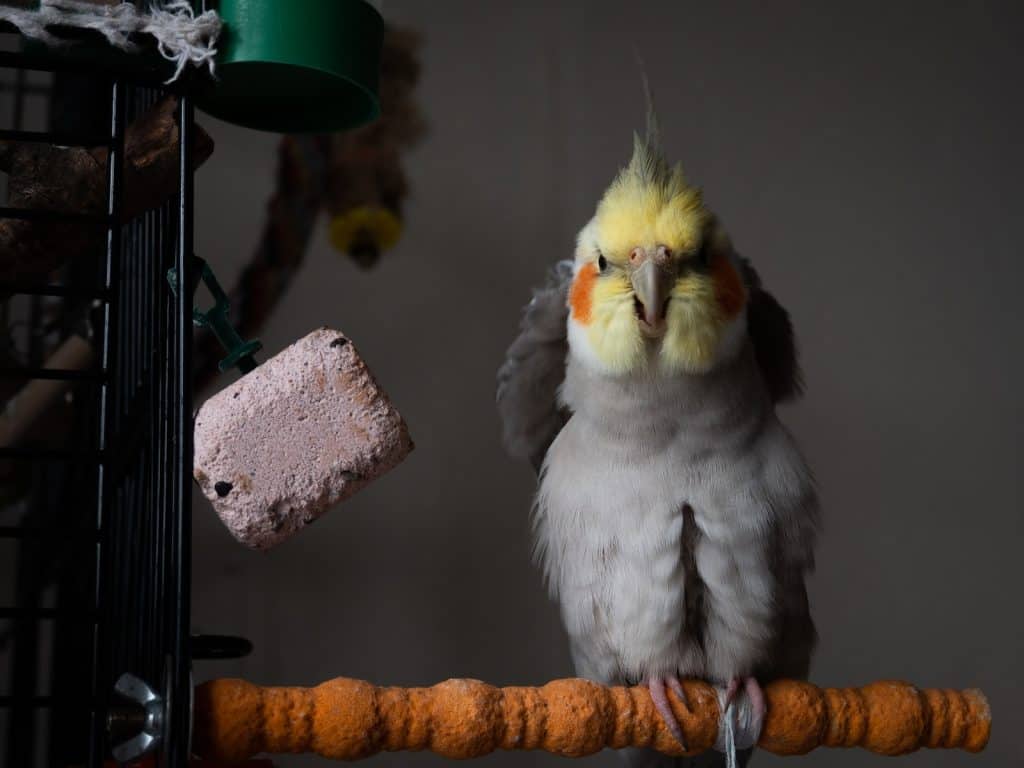
Cockatiel intelligence is a subject that fascinates bird enthusiasts and pet owners alike. As a member of the parrot species, cockatiels possess relatively high levels of avian intelligence amongst pet birds. Although not all cockatiels may exhibit the same degree of brain power, there’s plenty of anecdotal evidence to suggest that these birds are highly intelligent creatures.
When comparing cockatiels to other birds, it’s important to note that there are different forms of bird intelligence. For example, an African grey parrot may excel in problem-solving skills, whereas a crow could be renowned for its tool use. Similarly, cockatiels have their own unique set of cognitive abilities that set them apart from other bird species. While they might not be at the very top of the avian intelligence scale, smart cockatiels can perform tricks, solve problems, and even learn to mimic sounds and speech to some extent.
In fact, several aspects of bird intelligence are closely related to the size and structure of the avian brain. Some bird species, like parrots, have more neurons packed into their brains than mammals of a similar size. In birds, the pontine nuclei are especially well developed, which is linked to their higher intelligence. Although the term “bird brain” is often used as an insult to imply someone is unintelligent, it doesn’t hold true when considering the cognitive abilities of many bird species.
As a cockatiel owner, you’ll most likely have plenty of stories to share about how your pet displays impressive levels of smarts. Some anecdotal evidence suggests that male cockatiels can understand human language to a certain extent, and some have even been known to start whistling a tune they heard on a YouTube video. It’s important to remember that not all cockatiels display the same level of intelligence, just as not all humans are equal in their intellectual abilities.
Here are some ways that cockatiel owners can stimulate their bird’s mental capacities:
- Provide puzzle toys and problem-solving challenges to encourage cognitive development.
- Train your bird to perform tricks and associate certain words or sounds with specific actions.
- Monitor your cockatiel’s body language and vocalizations to better understand their preferences and emotions.
While cockatiel intelligence may not rival that of primates or some other parrot species, it’s important to recognize and appreciate the mental abilities of these charming pet birds. By taking the time to understand and stimulate your cockatiel’s intellectual capacities, you can foster a deeper bond with your pet and create a happy, healthy, and content cockatiel.
Social Behaviors
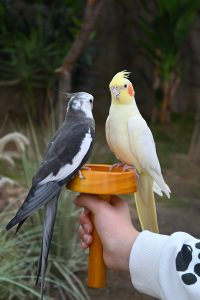
Cockatiel intelligence is often a topic of discussion among cockatiel owners. These fascinating members of the parrot species are known for their social skills and complex behaviors. In fact, the avian intelligence of cockatiels surpasses many other bird species, making them popular as pet birds.
While it’s important to remember that not all cockatiels will exhibit the same level of intelligence, there is plenty of anecdotal evidence to suggest that smart cockatiels are not a rarity. For instance, many bird enthusiasts can attest to the high bird intelligence that cockatiels possess, as well as their ability to problem-solve and learn tricks with ease.
An essential aspect of cockatiel intelligence is their understanding of body language and social cues, both with humans and other birds. These birds have an innate ability to connect and bond with their human caregivers, often displaying signs of empathy and emotional intelligence.
Cockatiels, being closely related to other more prominent parrot species such as African Greys and Macaws, show cognitive abilities comparable to their larger counterparts. Some avian brain researchers have even compared a cockatiel’s mental capacity to that of a two-year-old child.
Problem-solving skills vary among individuals, but many cockatiel owners have observed their beloved pets eagerly engaging in tasks that require mental stimulation. For example, some cockatiels have been known to work out how to open their cage doors or figure out intricate puzzle toys designed for dogs and cats.
Cockatiels are also renowned for their fantastic vocal mimicry abilities. This talent isn’t purely reserved for male cockatiels, although they are typically the stronger singers. These birds can learn a wide array of human words, phrases, and even songs, with some even becoming YouTube sensations for their impressive vocal performances.
Although the avian intelligence of cockatiels is often compared to that of a two-year-old child, it’s crucial to remember that their brain processing and functions differ substantially from humans. For example, a cockatiel’s pontine nuclei- the part of the brain that processes sensory information- are distinct from those of mammals. Despite these differences, however, it’s undeniable that cockatiels possess remarkable intelligence that sets them apart from many other bird species.
Communication Skills and Vocal Mimicry
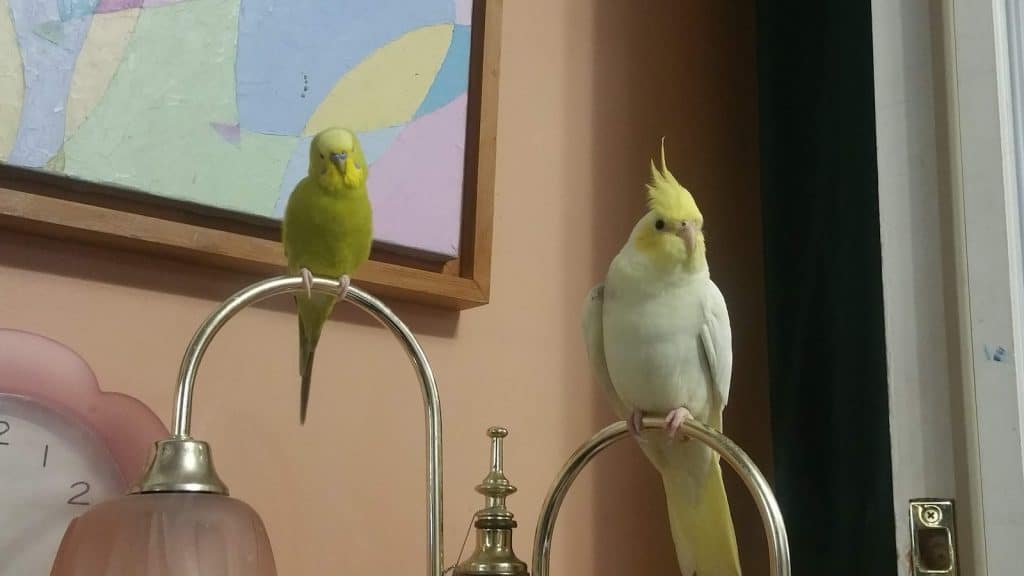
When it comes to cockatiel intelligence, these birds are often underrated. As members of the parrot species, cockatiels possess a variety of cognitive and communication abilities, impressing scientists and cockatiel owners alike. One area where they truly shine is in their communication skills and vocal mimicry.
Cockatiels are known for their ability to mimic sounds, including whistles, household noises, and even speech. Although they may not be as skilled as some other parrot species in verbal mimicry, their capacity for vocalization is still impressive. Male cockatiels, in particular, are known for their ability to learn and repeat sounds.
But their intelligence goes beyond their imitative abilities. Cockatiels exhibit problem-solving skills, showing a level of cognition comparable to a two-year-old child. These intelligent birds can:
- Solve puzzles and navigate obstacle courses
- Learn tricks, such as flipping switches, retrieving toys, and maneuvering through hoops
- Recognize themselves in mirrors, showcasing their self-awareness
Others in the avian world, such as crows and parrots, have also displayed high levels of avian intelligence through problem-solving and tool use, indicating that bird brains are quite impressive.
A fascinating aspect of avian intelligence is that, despite having smaller brains than mammals, birds tend to have more neurons. This allows birds like cockatiels to possess cognitive abilities that rival those of primates and even some mammals. For example, cockatiels can understand cause and effect, enabling them to solve problems and learn from experience.
Another important aspect of cockatiel intelligence is their social skills and emotional intelligence. They are closely related to the cockatoo family, which is known for its social behavior and strong bonds among individuals. Birds, in general, have a great capacity for communication through body language, vocalizations, and even play.
Mental stimulation is essential for a healthy and happy cockatiel. As a pet owner, providing puzzle toys, interactive playtime, and opportunities for learning new tricks can help foster your cockatiel’s cognitive abilities. Additionally, allowing your bird to interact with other birds can contribute to their social and emotional well-being.
- Size: 8.7x3.9 inch /22x10 cm
- Made of metal, it is safe and very resistant to bite.
- Entertaining enough to keep birds busy for a long period and they do enjoy playing with it.
- The bells is sweet sound, can attract the attention of the bird.
- The toy can help pet birds to ease the unhappy moods and release the pressure to keep them stimulated and healthy mentally.
Problem-Solving Abilities
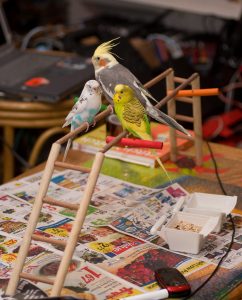
When it comes to cockatiel intelligence, these captivating birds often surprise their owners with their problem-solving skills. Among the various parrot species, cockatiels are considered to be quite intelligent, even though the term “bird brain” is often associated with lesser intelligence. In reality, bird intelligence, specifically avian intelligence, is highly developed in many species, and cockatiels are no exception.
Cockatiels, like other birds in the parrot family, have a remarkable ability to solve problems and learn new behaviors. Some bird species, such as parrots and corvids, are known to possess cognitive abilities on par with primates, even though their brain size is smaller. For example, some smart cockatiels have been known to perform tricks, use tools in the wild, and even mimic human speech and sounds.
Avian brain structure differs from that of mammals, and as a result, the way we measure intelligence in birds is not always the same as for animals like dogs or cats. Nevertheless, cockatiels possess an impressive number of neurons in their brains, which contribute to their higher intelligence and problem-solving abilities.
Anecdotal Evidence of Cockatiel Intelligence
Many cockatiel owners can attest to the cleverness of their pet birds. One popular example is a YouTube video showing a cockatiel successfully uncovering a hidden treat using a series of pre-placed tools. This level of problem solving is akin to the cognitive abilities of a two-year-old child.
As intelligent birds, cockatiels require mental stimulation to keep them content. Providing your pet with puzzle toys and new challenges will help prevent boredom and ensure a happy, engaged bird.
Social Skills and Emotional Intelligence
In addition to problem-solving, cockatiels’ intelligence extends to their social skills and emotional intelligence. These birds are quite adept at reading their humans’ body language, tone of voice, and emotional state. When closely related to other bird species (such as the cockatoo family), cockatiels demonstrate compassionate behaviors, like preening and cuddling, indicating emotional intelligence.
Not All Cockatiels Are the Same
It’s important to note that not all cockatiels are equally intelligent. Just like other species of birds and animals, cognitive abilities can vary among individual birds. Male cockatiels tend to exhibit more problem-solving skills and impressive memory compared to females, although there are certainly exceptions.
Playfulness and Curiosity
When it comes to cockatiel intelligence, these charming birds have a lot to offer. They’re considered one of the more intelligent parrot species, making them attractive companions for cockatiel owners who appreciate their curious and playful nature. While their intelligence might not earn them the “bird brain” stereotype held by some, there’s no denying that cockatiels possess impressive cognitive abilities.
In the world of avian intelligence, different bird species demonstrate a wide range of cognitive abilities. Although it’s difficult to accurately measure bird intelligence due to the complexity of avian brain structures, many pet birds – such as cockatiels – are recognized as smart, inquisitive, and engaging pets. They may not be at the very top of the avian intelligence ladder, but they’re still highly capable and clever in their own right.
Scientific research on cockatiel intelligence is sparse, but anecdotal evidence from cockatiel owners suggests that these birds have a fascination and capacity for problem-solving and learning. For example:
- Engaging with puzzle toys designed for parrots
- Quickly learning tricks and complex task commands
- Using their memory to recall routines, sounds, and even words
It’s important to recognize that, while many cockatiels demonstrate a natural curiosity and eagerness to learn, not all cockatiels will possess the same cognitive abilities. Just like humans, individual birds will vary in intelligence and personality. It’s up to the pet owner to provide a nurturing and stimulating environment to help their cockatiel reach its full potential.
When comparing the intelligence of cockatiels to other closely related members of the parrot family, you’ll find similar cognitive abilities and interesting behaviors. For example, the brain size and structure of many parrot species rank them among the most intelligent birds on the planet. Research has shown these birds capable of making tools, reading human body language, and even possessing a level of emotional intelligence akin to a two-year-old child.
Cockatiels may not meet all these benchmark feats, but they do share many traits with other intelligent birds, such as:
- Their ability to solve problems, both for mental stimulation and to seek food rewards
- Their affinity for social interaction, both with humans and other birds
- Their natural inclination for vocal mimicry and learning new sounds
Comparing Cockatiel Intelligence With Other Birds

When it comes to cockatiel intelligence, these charming birds often surprise their owners with their remarkable skills and abilities. Although often referred to as “bird brains,” the intelligence of cockatiels and other avian species shouldn’t be underestimated. So, how do cockatiels measure up when compared to other birds?
Cockatiels belong to the parrot family, a diverse group of birds known for their cognitive abilities and impressive problem-solving skills. When comparing cockatiel intelligence to that of other parrot species, it’s important to remember that not all parrots are created equal. Some are considered more intelligent than others, based on their ability to perform problem-solving tasks, brain size, and anecdotal evidence from pet owners.
Cockatiels and parrots share several similarities when it comes to avian intelligence, but it’s crucial to understand that not all cockatiels will exhibit the same level of intelligence as some of the smartest parrot species. For example, African grey parrots are often regarded as one of the most intelligent birds due to their excellent problem-solving skills and ability to mimic speech. Comparatively, cockatiels are generally not as adept at these tasks, but they’re still considered intelligent birds.
Let’s take a deeper look at some avian intelligence features commonly seen in cockatiels:
- Cognitive abilities: Cockatiels are known to be quick learners, capable of performing tricks and solving simple problems, like opening their cage doors or retrieving hidden treats. Their cognitive skills may not be on par with those of more advanced parrot species, but they’re still impressive.
- Memory: Like many bird species, cockatiels are believed to possess a good memory, allowing them to recognize and remember their owners, cage layout, and specific sounds.
- Social skills: Cockatiels exhibit strong social skills and emotional intelligence. They thrive on social interaction and are known to bond closely with their owners, showing affection and even exhibiting jealousy at times.
- Problem-solving: While research on cockatiel intelligence is limited compared to other parrot species, anecdotal evidence suggests they can solve simple problems with ease, such as figuring out how to escape their cage or access hidden food.
When comparing the intelligence of cockatiels to other bird species, such as songbirds or members of the corvid family (like crows and ravens), it’s important to note that avian intelligence can be highly specialized and dependent on each species’ unique characteristics. For instance, crows may demonstrate remarkable problem-solving skills and tool use, while cockatiels excel at social behavior and bonding.
In the realm of pet birds, cockatiels are often considered one of the smartest and most trainable species due to their curiosity, intelligence, and sociability. They may not possess the same level of cognitive abilities as their African Grey cousins or other highly intelligent birds, but their endearing personalities and love for human companionship make them fantastic pets.
So, while cockatiels may not be the einsteins of the bird world, they certainly hold their own in terms of intelligence and continue to surprise and delight their owners with their clever antics and engaging personalities.
Final Thoughts
Cockatiel intelligence is often underestimated due to their small size. However, many bird enthusiasts and pet owners consider them to be one of the more intelligent birds in the avian world. When comparing them to other bird species, particularly those in the cockatoo family, cockatiels possess a unique set of cognitive abilities and emotional intelligence.
Anecdotal evidence shared by cockatiel owners supports the idea that these birds are smart and able to learn various tricks. This ability to problem solve might not be at the level of parrot intelligence, but it demonstrates a higher level of thinking than many other pet birds.
Here are some more insights into cockatiel intelligence:
- Cockatiel owners have observed their pets performing tricks and even talking, albeit to a limited degree compared to parrot species.
- Male cockatiels are known for their ability to mimic tunes and start whistling songs they’ve heard only a few times.
- Cockatiels, as a species, might closely resemble the intelligence of a two-year-old child, according to some experts.
- While not all cockatiels can solve complex problems, anecdotal evidence suggests that they can exhibit creativity in problem solving and learning.
- Mental stimulation and social interaction are essential for a content cockatiel, helping to highlight their intelligent nature.
In short, it’s crucial to not underestimate the cognitive capabilities of your cockatiel. While they may not rival notably intelligent birds like parrots or African Greys, they still possess a level of avian intelligence that sets them apart from other pet birds. By providing ample mental stimulation, social interaction, and opportunities for problem solving, you’ll help keep your smart cockatiel happy and healthy.
It’s fantastic to see such a small and seemingly simple creature display such impressive cognitive abilities. They remind us not to judge bird intelligence on size alone and to appreciate these feathered friends for their unique qualities. After all, there’s more to a bird than just the flashy feathers and cute faces – there’s a fascinating world of avian intelligence waiting to be discovered.
